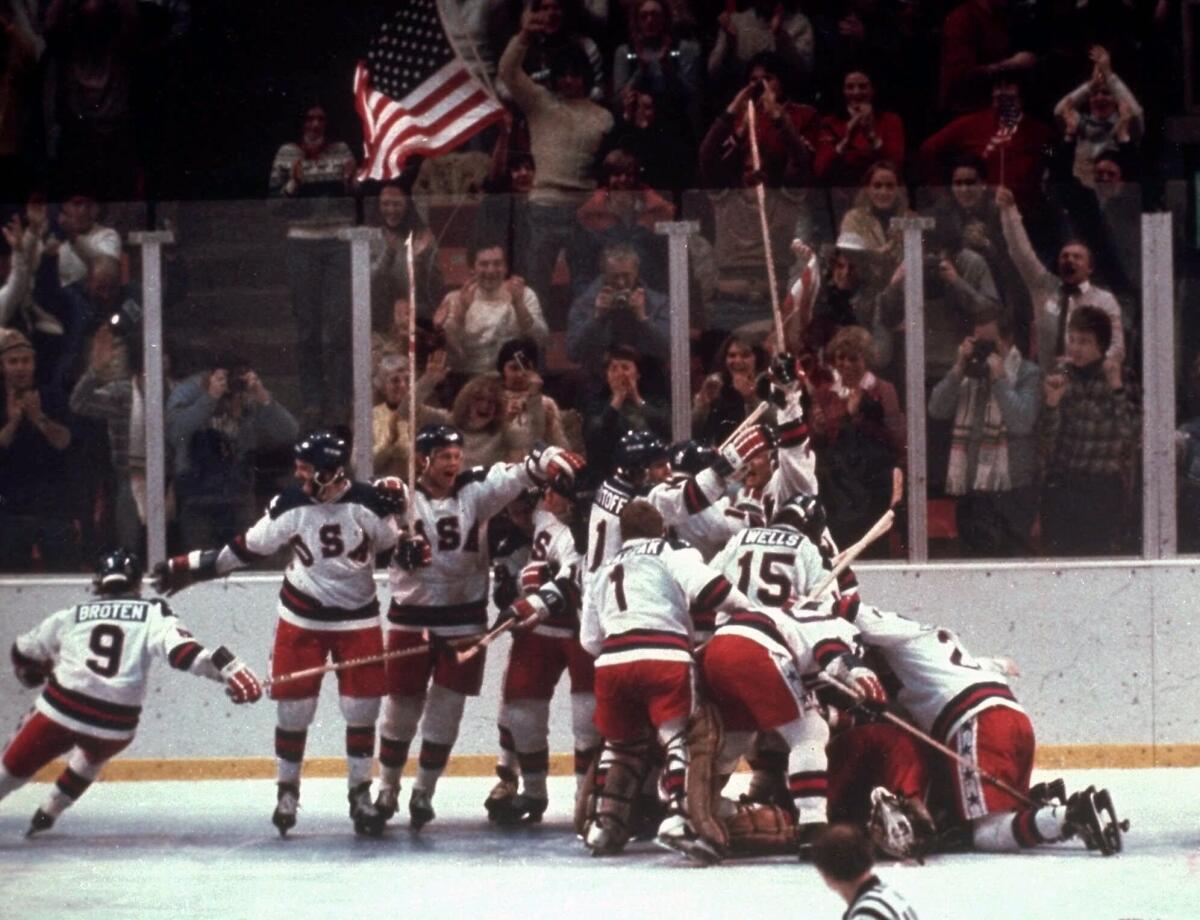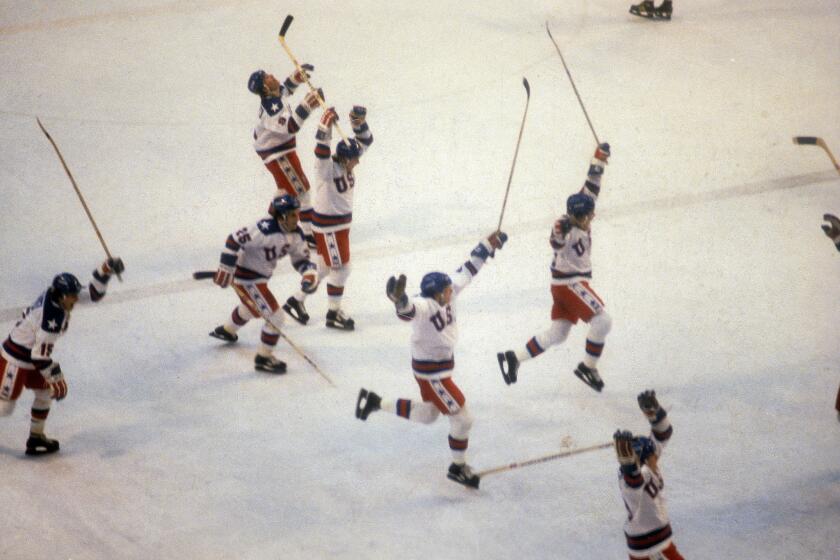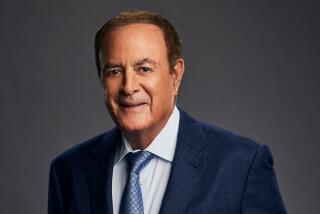‘Miracle’ revived the memory and glory of the 1980 U.S. hockey team’s triumph
- Share via
When producers from the movie “Miracle” approached Al Michaels to participate in their film about the legendary 1980 U.S. Olympic hockey team, the Hall of Fame broadcaster agreed ... on one condition.
They had to get the crux of the story correct.
“I will do this,” said Michaels, who re-created parts of his famous TV broadcast calls of the 1980 games for the movie. “But, I would only narrate what I remember to be … the actual truth.”
Michaels had nothing to worry about.
The stunning triumph of that 1980 U.S. team, which shocked the world 40 years ago Saturday by beating the Soviet Union en route to a gold medal, still resonates. Four decades later, it partially has the 2004 film to thank.
“[The movie] really got back into exactly what was taking place and how it took place,” Michaels said, speaking on a conference call about his memories from those Olympics. “A little bit was over the top, as is the case with most movies trying to re-create real life. But I thought they caught the essence of it.”
Traditionally, hockey movies of the late 20th century fell within the same broad strokes: light-hearted comedies with unconvincing action sequences. Pictures such as “Slap Shot” and “The Mighty Ducks” were cult hits, but hardly the appropriate template for the makers of “Miracle” to follow.
The Ducks dealt forward Ondrej Kase to the Boston Bruins in exchange for forward David Backes, prospect Axel Andersson and a 2020 first-round pick.
Mark Ciardi, a longtime Hollywood producer who specializes in sports movies, was one of the main producers on the film. From the start, he remembers director Gavin O’Connor’s intention was to pursue a different cinematic tone, one that captured all the political Cold War turmoil surrounding that winter’s Games.
“A lot of sports stories are pretty personal, the arc of the central character,” Ciardi said. “To have a sports film with an international, political crisis happening with the Cold War — I remember that there was a real fear we’d be in a war with Russia, a nuclear war — it was incredibly tense. Leading up to that game, it played to a bigger stage.”
Added Michaels: “Gavin had told me earlier on, they wanted to turn this into a total love story between Herb and Patty Brooks,” the U.S. coach and his wife.
For the good of the story, Ciardi said, that didn’t happen.
“This was such a heroic, amazing story,” Ciardi said. “People were weeping in the premiere.”

The 1980 Winter Olympics hockey tournament played out like a Hollywood script itself. In an era before NHL players participated in the Games, the 20-man American team was comprised of mostly college students, only 13 of whom would go on to play in the NHL. The Soviets, on the other hand, were considered the best team in the world (NHL or otherwise) and had won the gold medal in the past four Olympics.
Beating the Soviets and winning gold, the team’s captain Mike Eruzione said, “was an impossible dream.”
For those born after 1980, the film helped bring that fantasy back to life.
“Back then, when the movie came out, it was huge,” said 26-year-old Kings forward Alex Iafallo, who grew up outside of Buffalo. “We watched it all the time on the road as a team, just to get inspiration.”
Added Calgary Flames defenseman Noah Hanifin, a 23-year-old from Boston: “A lot of American kids now grew up watching that movie and got interest in the game from it. My buddies back home all have it memorized. It’s a legendary movie.”
The back-and-forth relationship between Brooks, played to acclaim in the film by Kurt Russell, and his team gave the movie its heart. Ciardi recalled the casting crew considering a number of other actors, including Michael Douglas, before settling on Russell. Looking back at Russell’s performance, which crescendoed with a galvanizing pregame locker room speech, Ciardi can’t imagine any other choice.
Surviving members of the U.S. team will gather next week in Las Vegas to celebrate the 40th anniversary of their victory over the Soviets and gold-medal triumph over Finland two days later.
“Once we started to zero in on Kurt and he met with Herb, it was like, ‘Oh, this is the guy,’” Ciardi said. “Once we got on the set, you heard these very subtle things. His wardrobe. His hair. His speech. It was so close to what Herb was.”
Filmmakers strived for the same accuracy in the difficult-to-shoot action scenes too.
Current Kings goalie coach Bill Ranford performed the action scenes of U.S. goalie Jim Craig (who was otherwise played by actor Eddie Cahill) during the weeks-long filming process at a rink in Vancouver.
“We were really focused on trying to make it as real as possible,” said Ranford, who had recently retired from the NHL and played the same stand-up style as the actual Jim Craig. “We let the hockey make the events, versus the other way around.”
The stunt team watched film of the 1980 games to re-create entire sequences of play, not just brief climactic moments. They staged minutes-long scrimmages to capture seconds of genuine action. They didn’t fake the checking and body contact either.
“I got a cut in the movie and a concussion in the movie,” Ranford chuckled.
But the end product — which made $64.5 million at the box office and earned a second life on digital streaming platforms Disney+ and Netflix — was worth it.
“The biggest worry for us was … what would end up on the editing floor once it got away from the hockey people?” Ranford said. “That’s where we were very appreciative of the final result, because they did a good job.”
The screenplay, written almost entirely by Mike Rich (who was uncredited because of union technicalities), took few liberties as well. Some details — such as the exaggerated tension between American players from Minnesota and Boston, according to Eruzione — were stretched. But, as Michaels was promised, the core of the story was kept intact.
“This thing sings, it resonates,” Michaels said. “It provides tremendous inspiration, and it will for a lot more years.”
During production, Michaels resisted only one request: “They wanted me to voice over the last 25 or 30 seconds” of the Soviet game, he said, the moment of his iconic, “Do you believe in miracles? Yes!” line.
His response: “Not over my dead body.”
Michaels laughs at the exchange now. Instead, he said, pointing out the movie’s ultimate moment of immortalization, “they used the actual tape from Lake Placid.”
More to Read
Go beyond the scoreboard
Get the latest on L.A.'s teams in the daily Sports Report newsletter.
You may occasionally receive promotional content from the Los Angeles Times.








